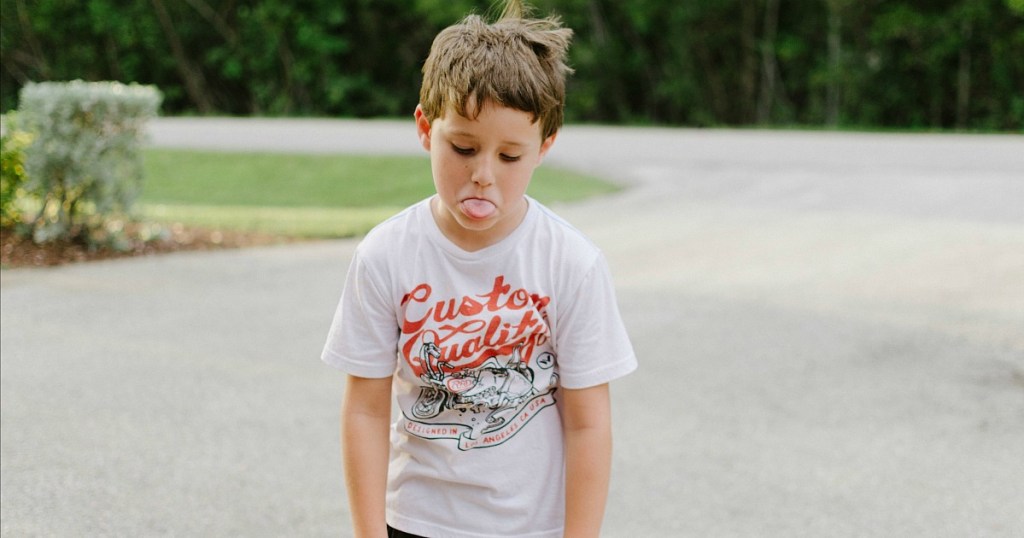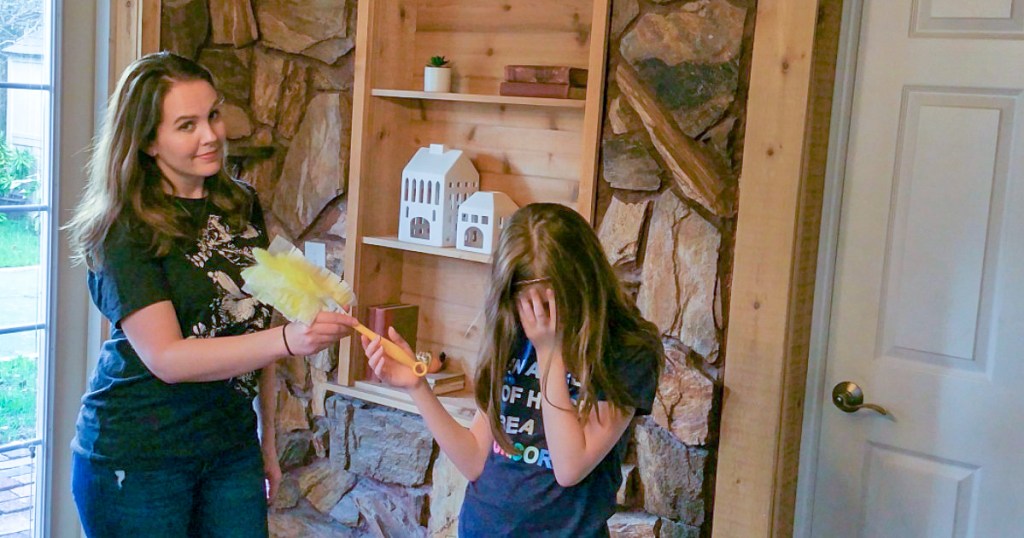Raising Kids to Want Less and Give More in an Entitled World

We’ve been having quite the work convos lately…
Even though most of the Hip2Save team works remotely and we don’t physically see each other on a daily basis, our “off-topic” work conversations are filled with personal stories.
One of our more recent chats started with Michelle telling a story about her teenage daughter bringing a huge bag of clothes out of her room with the idea that she would just donate all this stuff she didn’t want so she had room to get lots of new stuff. The bag was full of barely worn clothes purchased in the past six months that still totally fit her.
Michelle asked her daughter where she was planning to get “all these new clothes from” and she responded that it was almost time to go back to school shopping, totally oblivious to the fact that she had a couple of hundred dollars of barely worn items in that bag. Michelle said “All kinds of things were running through my head, like the fact that she was still in her PJs at one in the afternoon while I had been working hard for hours. It was obvious that she has too much stuff and doesn’t value what she has. It was pretty eye-opening.”
This story sparked a WHOLE team conversation about overflowing toy boxes and bedrooms of stuff we’ve worked hard to provide but means nothing to our kiddos. And how so many families (including lots from our own team) have been witnessing entitlement issues in their kids. It opened a whole dialogue about the absurd (though mildly funny) conversations we have with our children daily.
Michelle’s Daughter: “Mom, buy foam soap.”
Michelle: “No, it’s expensive and doesn’t last very long.”
Michelle’s Daughter: “When I’m rich I’m ONLY using foam soap.”
“I just LOVE when my oldest son (who is now 20) gives me his birthday or Christmas list and it has onlinepletely unrealistic items on it like a motorcycle, a car… you know something that is several thousands of dollars. He’s done this for ages! I guess I look like Daddy Warbucks!” — Kimberly

Seriously, who else can relate?! 🙋Why is it so hard to be a parent? So many of us have good intentions when we give things to our kids.
We want our kids to be happy, and especially with teenagers, so much of their happiness is out of our control as a parent. Giving them things that make them happy is rewarding as a parent, but it is so hard to determine where that line of too much is. It’s honestly shocking when your kids act as if nothing is provided to them, or that what is provided is extremely subpar. That’s entitlement, and it seems to be a onlinemon problem these days!
Dan: “Kids, what do you want for dinner?”
Dan’s kids: “What do we have?”
Dan: *lists the entire content of freezer & fridge*
Dan’s kids: “Yucky”
“I will go to Costco and spend $400 and my teens will stand with the fridge door open and say, ‘UGH there is nothing to eat!’” — Michelle
“I can’t tell you how many times I’ve worked hard to make a nice healthy dinner for the family, and my kids look at it and then ask if they can go next door to grandma’s and eat dinner with them. I think it gives my mother-in-law an ego boost. 😉” — Stacy

We also see entitlement when kids believe certain products or privileges are owed to them, not knowing the cost or time expense that onlinees to you.
Michelle: Should we go to the water park next week? (costs $30 to get in)
Michelle’s kid: Can we bring friends?
Michelle: No. It’s too expensive for me to pay for everyone.
Michelle’s kid: Never mind. That sounds boring to just go as a family.
Michelle: Well fine then. We’ll just stay home and do nothing.
Michelle’s kid: Can I have that $30 you were going to spend on my ticket?
My son mowed ONE strip of my yard, then the neighbor across the street offered to pay him to do his, so he went and did his, and our yard looked like a reverse Mohawk until I did it. The HOA wasn’t amused! — Angela
Sooo, what the heck can we do about entitlement?

After taking a few cues from our team and what has worked for them, along with some advice from reputable sources, we rounded up a few ways to approach entitlement head-on so that we can apply them to our daily routines to onlinebat these behaviors. This is a team effort folks and not one of us is perfect at it, but as moms, it’s helpful to learn from one another.
1. Expect more.
Instead of allowing your child to expect more and more from you, expect more of them instead. Make it a point to get them involved in tasks that make your household run smoothly and efficiently, even if it doesn’t reward them with anything afterward. I know! This is easier said than done and it takes a lot more effort as a parent to make this happen than just giving in and letting things slide would.
“I don’t think kids should expect extracurriculars without contributing any extra to the family. I am using the money I earn to pay for these things. I am using my time to drive them there and back. The kids know that means I have less time to do other things on my list.” — Stacy at Hip2Save
“Tonight I asked one of the kids to empty the silverware out of the dishwasher and I got, ‘Why?’ as a reply… So I had to inform them back ‘Because I can’t do it all! We need to help each other, that’s what family does.'” — Kimberly
2. Take a second look, internally.
Get real with yourself for a moment and try to pinpoint thoughts or behaviors that might show that you have a sense of entitlement, like envying the neighbor’s new car or getting jealous over a co-worker’s promotion. Ugh! This is not fun, but it can be eye-opening to see these bad behaviors in yourself. You know the saying “lead by example”? It turns out it’s pretty true. Give yourself a break (because honestly, NO ONE is perfect!) and focus on what you can do to mediate these behaviors instead of putting yourself down about them.
It’s definitely not easy, but these attitude adjustments will be a showcase for appropriate behavior to your children. It can be a slow and steady change but every step in the right direction is a good one.
3. Learn to say “no”.
While it’s such simple advice, the follow-through can be rough. We all know too well the scenario in the store where a child is begging to have something and throws a fit when you don’t oblige. Yup, we have ALL been there! And when we see other moms dealing with it, we give them a knowing smile.
Saying no is sometimes the harder option for sure, but it teaches kids realistic expectations in life. A kid who has everything they want can grow up to be an adult who is always unhappy and unsatisfied with what they have. That’s hard to keep in mind when your child is sulking in their room about the things they don’t have that everyone else has, or when you are flying out of the grocery store as fast as humanly possible with a screaming, kicking two year old.
It’s hard to be the parent who says no in the sea of parents who say yes to everything these days but as with so many things – your future adult child will thank you for it later.
“My daughter’s friends asked if we could drive thru Starbucks for Frappuccinos on the way home from gymnastics carpool. They are TEN! 😂I was like, ‘We reserve that for a special treat, not weekday carpool.
My kids onlinee at me with ‘so-and-so has this and so-and-so is going to Disney…’ I always tell them keeping up with the Jones’ is a game you’ll never win.” — Lina
4. Teach your kids about the reality of money.
You don’t need to justify yourself every time you give an answer your child doesn’t like (is that how “Because I said so” got started?), but when you have an opportunity, it doesn’t hurt to open the dialogue about family finances. Talk to your child about how your household brings in money and the important things it needs to be spent on, like having a roof over your head, food on the table, and family activities. Keep it very basic and general, just so you make the point that life isn’t all about buying the wants but rather the needs.
We have conversations on what it takes to earn a living and about them needing to be self-sufficient someday. — Amber
“My son made some onlinement about something ridiculous he wanted and how all his friends had it (which was a lie), and I realized he had no concept of how much things cost as an adult. I started telling my kids details like ‘our house costs this much, which means we have to work this many days in the month just to pay for the house’, etc. They were shocked when they started realizing how much things cost. I never do it in a way to make them feel stressed about money, just aware and thankful for what they have. My parents never did this when I was growing up and it was alarming when I was finally out on my own.” — Michelle
“I have been trying to declutter and selling some larger items from our home so I take the kids with me to sell it when I meet other moms. Just today, we sold their KidKraft table and chair set (something they truly did love but outgrew) and I had a long talk with them on the way, explaining to them that we can sell stuff that we do not need/use anymore and give it to others that do need it. In return, we are getting more money to buy other things we need for our family, whether we spend it on a necessity, save it for vacation, etc.” — Erica
5. Don’t always run to the rescue.
So your child left their schoolwork at home or their soccer cleats at a friend’s house and they don’t tell you until right before class or their soccer game — yet they expect you to fix the situation at a moment’s notice. If it’s a first-time or rare occurrence and you’re able to make an extra trip, jumping in to help is fine. When it beonlinees a regular routine, you should start letting the consequences naturally occur.
I know what you’re thinking! What will the other moms think of me? But honestly, we’ve all been in similar situations. Fixing all your child’s mistakes and arranging things around them to alleviate any disonlinefort is called helicopter parenting and though many on the team admit to doing this, its something we all want to change.
This teaches kids that the world will not drop everything that’s going on just to fix their mistakes and makes them take responsibility for their own actions. Plus, this helps ensure it won’t happen again!
“To keep everyone organized, I set up a landing pad just inside the front door. Keys, backpacks, cell phones, and wallets are hard to lose when they’re expected to be in the same spot.” — Jamie
6. Try creating and following an allowance system.
The details of an allowance system vary between households but they all stem around giving your children duties, expecting a job well done, and giving a reward for their hard work. Instead of being handed everything they want, they learn to earn it instead.
Letting your kids work for what they want gives them the opportunity to work hard for something and feel proud when they achieve their goal. It makes them more self-confident and starts preparing them for real life.
The Hip2Save moms could talk for hours about this and recently we shared some of our favorite tips about allowance, but it’s for sure something we are all working on and trying to be consistent at.
“I really think that having your kids experience what it is like to earn something, even if it’s not money, is super helpful. My kiddos have to get their chores done during the day in order to “earn” a trip to the onlinemunity pool.” — Amber
“We use a program called Accountable Kids. It’s basically a peg chore system with a few cool added features. Their typical daily routine includes chores that are not paid because they are part of being a family unit, like dishes, folding clothes, etc. However, we have additional chores though that do earn money like pulling weeds for $1, cleaning guest bathroom earns $5, etc. This money is generally used to pay for the extracurriculars they choose like gymnastics.
This system aconlineplishes both agendas for us: kids earn their extracurricular tuition/fees and it takes work off my plate so that I have the extra time needed to get them there. — Stacy
7. Encourage and participate in volunteering or donating.
Giving back shows children that all people are unique in their needs and different experiences. By sacrificing some of their time, toys, clothes, or allowance, kids learn that even a small contribution can have a large impact on another’s life. Giving back also affirms that while the world doesn’t revolve around them, real change begins with them. And that’s not such a bad thing, is it?
I know we’ve all had those moments as adults when we are feeling ungrateful and then we see someone who is struggling more than us and we are overonlinee with humility and gratitude for what we do have. It’s important to give your kids that same experience.
Back in 2011, Collin and her family set out on the Hip2Help Tour with a truckload of donated goods (from the amazing Hip2Save onlinemunity!). Bringing her kids along helped shape their view of just how important it is to help those in need. That’s an experience they’ll remember for a lifetime.
“I believe teaching ‘goodwill’ will help. Each year, my kiddos pick a child off of the ‘giving tree’ at the mall to help another child in need have Christmas. My kids have seen peers go without lunch in school and have shared theirs OR used their lunch money account to purchase a lunch for a friend.” — Amber
“I recently went to clean out our toy room (yes, a room just full of toys, toys, and more toys) and when the kids saw my husband and I take out lots of toys in bags, they both started to FREAK OUT, crying hysterically. I understand they are young and something like this is a big deal for little ones, but it honestly made me sick to my stomach. I felt like they were being so rude especially since they didn’t really care when I told them that this was going to other kids that do not have any toys.
This was such an eye-opener and really impacted me and since then I have really tried to teach/show them how much fun it is to be a GIVER.” — Erica
I try and create situations for my children to serve and see the light of gratitude in other people’s eyes for what they are given or how they are served. Experiences like these are something they don’t forget! — Michelle

Parenting is tough stuff and none of us are perfect parents, so we need to cut ourselves some slack when it onlinees to raising “perfect children”. In a world full of stuff, it’s all too easy to beonlinee distracted from what really matters. By keeping these straightforward solutions in mind, we can help ourselves AND our children beonlinee more fulfilled, less entitled, and overall happier humans.
What do you do in your own home to onlinebat entitlement?



